Bothersome Bugs
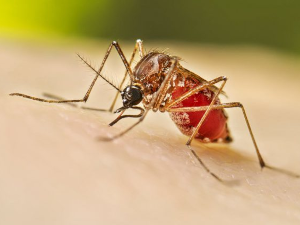
Mosquitoes
Nobody enjoys being a hearty meal for a hungry mosquito, and I'm sorry to break it to you, but Oakhurst is chock-full of the little buggers. While bites from mosquitoes are unpleasant enough, the fly is a vector of various diseases, making them the deadliest animal in the world. Malaria may no longer be a problem in the US, but the same can not be said of the West Nile virus; in 2022 eight people died of the disease in Illinois.
During the summer, volunteers should take necessary precautions to avoid becoming an all you can eat buffet. If possible, you should keep the amount of bare skin to a minimum (long sleeves, long pants), and opt for clothing with a tight weave. Tighter weave fabrics such as polyester provide a physical barrier that is harder for mosquitoes to bite through; the downside is they are less breathable than cotton.
More importantly, you should apply an insect repellent that interferes with the mosquito's ability to locate you - either that or stop exhaling carbon dioxide.
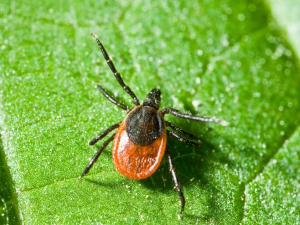
Ticks
These small arachnids love hanging out in the tall grass, waiting to hitch a ride with a passing volunteer who will provide them with free board and lodging. Please don’t be fooled by their irresistible charm - these guys and gals are not your friend. While you are oblivious, they will seek out a cozy spot to latch on to your skin and start drinking your blood. As vectors of Borrelia burgdorferi, the bacterium that causes Lyme disease, you really don’t want that to happen. Therefore, it is important to take precautions.
- You can avoid spots were ticks usually hang out, but this may result in a rather unproductive workday.
- Make it tougher for them to get under your clothes by tucking your shirt into your pants, and pants into socks. Needless to say, this preventative measure works best when you have long pants, long socks, and a long-sleeved shirt.
- Opt for light colored garments, which make spotting a tick crawling on you that much easier.
- Apply a long lasting insect repellent, either DEET or picaridin
- Purchase clothing pre-treated with the insecticide permethrin - which kills insects shortly after contact. The insecticide is chemically bonded to the fabric, so remains active through dozens of wash cycles. Alternatively, you can buy permethrin in a spray can and treat your clothes yourself - just not while wearing them. These clothes remain effective for 3 to 6 wash cycles.
- Finally, you should always conduct a full tick check once you get home. By this, I mean strip down to your birthday suit and check yourself in a mirror - or turn this a bonding moment - and have someone do it for you.
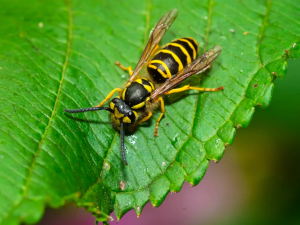
Yellow Jackets
While not usually a problem, it is important to remember that these wasps will often sting without much provocation. Yellow jackets numbers will increase as the summer progresses, and as their typical food becomes scarce, they will seek out alternatives - usually picnics where sugar is plentiful.
If you are being bothered by a yellow jacket, try to calmly walk away. Swatting it may only make it angry, and increase the chance that it stings. In the event that you are stung, check with the steward as they usually carry benzocaine swabs that provide some pain relief.
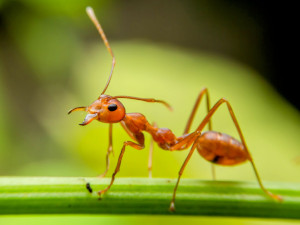
Ants
Once thing to always keep in mind when working in a prairie is that ants are everywhere. This is not normally a problem until to find yourself standing on one of their mounds, at which point, they are going to be very pissed off. So if the ground beneath your feet is suddenly higher than a moment before, try not to linger too long.
I learned this lesson the hard way, and soon has a bunch of biting ants crawling up my legs. While this was at a preserve other than Oakhurst, I still pay attention to where I walk.
Insect repellents
An repellent is a chemical that interferes with an insect's ability to taste and smell, therefore preventing it from getting close enough to bite you. They do not kill the insect in question.
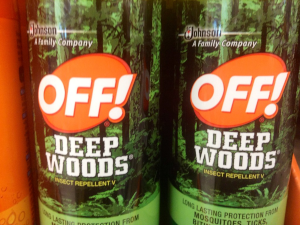
DEET
When it comes to preventing bug bites, nothing quite beats DEET for its effectiveness. Developed in 1946 by the US Army, and introduced to the public in 1957, N,N-diethyl-meta-toluamide is now the most widely used insect repellent on the market. After 60 years of use and numerous scientific studies, its safety record is well established. No other repellent has been as studied and tested as much as DEET.
When working in the woods, I typically use 25% DEET, which lasts for up to 8 hours.
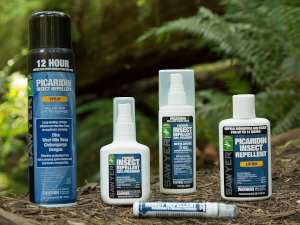
Picaridin
If I had to use a repellent other than DEET, I would opt for picaridin. This synthetic compound was produced by Bayer in the 1980s, but has only been available for use in the United States since 2005. It is considered to be safe, although some would argue that not enough time has elapsed to determine the long term health risk, should they exist.
As far as effectiveness, it is on par with DEET with regards to mosquitoes and ticks. One advantage of picaridin is that it is odorless, non-greasy, and does not dissolve plastics - all characteristic of DEET. So if you don't use DEET because of how it feels or smells, then picaridin may be a better option for you.
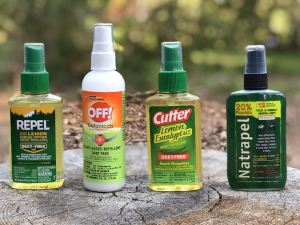
Oil of Lemon Eucalyptus
This is a plant based repellent derived from the lemon-scented gum tree, Corymbia citriodora, and is another alternative for those wanting to avoid DEET. While the active ingredient, para-menthane-3,8-diol, occurs naturally in the leaves and twigs of the tree, it is normally a synthesized product.
Oil of lemon eucalyptus (OLE) has been shown to repel mosquitoes and ticks, with a 30% product lasting between 4 to 6 hours, making it as effective as 15-20% DEET. OLE should not be confused with the essential oil bearing the same name, which is not registered as an insect repellent. Like picardin, the repellent does not leave you feeling greasy, and can be applied to plastics.

Natural Repellents
There are numerous repellents on the market that contain natural oils such as citronella, cedar, lavender, cinnamon, geranium, peppermint, lemongrass and soybean. For these, EPA has determined that the active ingredient poses minimal risk to human health at the percentages used. As such, none of these repellents need to registered with the EPA, but it also means they do not need to be tested for their effectiveness, unlike DEET, picaradin and lemon eucalyptus.
Applying Insect Repellents
As with any product, some people are going to have a negative reaction to insect repellents, usually manifesting as skin irritation. Common sense dictates you should read the directions for any product you apply to your skin or clothes, but in case you don't:
- do not apply repellents to irritated skin, or over wounds or cuts
- do not apply under your clothes
- do not ingest or apply near the eyes
- do not spray directly onto your face; instead, spray hands and rub on
- do not over apply
- do not use a combination sunscreen & repellent
Insecticides
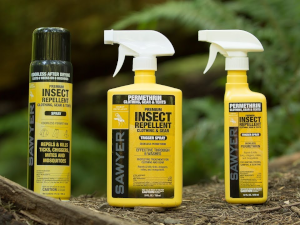
Permethrin
There is really only one insecticide on the market worth discussing, and that is permethrin. Let's be very clear here, insecticides are a completely different kettle of fish, despite the permethrin packaging describing it as a repellent. This is a synthetic compound, similar to the extracts from the chrysanthemum flower, that affects the nervous system of insects, paralyzing them on contact, and usually resulting in their death. The chemical can be found in flea dips, dog collars, creams and lotions for lice, bedbug sprays, and of course, clothing.
While you can purchase clothing pretreated with permethrin, you can also buy a spray can and apply it yourself. Typically, clothes treated this way are good for 6 weeks, or 6 wash cycles. If applying yourself, please remember the following safety rules:
- Don't spray clothes while wearing them, and never spray your skin
- Only treat your outer most clothing
- To reduce the risk of inhalation, wear a mask and apply outside
- Allow the clothes to dry for 2 hours before wearing them
While I would caution against overuse of an insecticide, applying it to socks can help stop ticks from crawling up your leg. If you have to venture into mosquito infested woods, then I would also recommend applying it to your shirt and hat.
The toxicity to mammals and birds is very low, as we can metabolize the toxin before it accumulates in our body. Cats are the exception, and they are deficient in break it down; so when exposed to high enough concentrations can suffer from tremors, twitching, hyper-salivation, increase body temperatures, and in worse cases, seizures and coma If you are a cat lover, then you should be aware that cats more sensitive to permethrin than most mammals, you extra caution is required.

Mosquito Headnet
I try my best to avoid going into the woods during the summer, when mosquitoes are rampant, but when I do I am normally covered up from head to toe. Since my face is the only part of my body with exposed skin, I wear a mosquito headnet. For extra protection, headnets can be treated with permethrin.

 Volunteering
Volunteering Safety
Safety Wildlife
Wildlife Newsletter
Newsletter